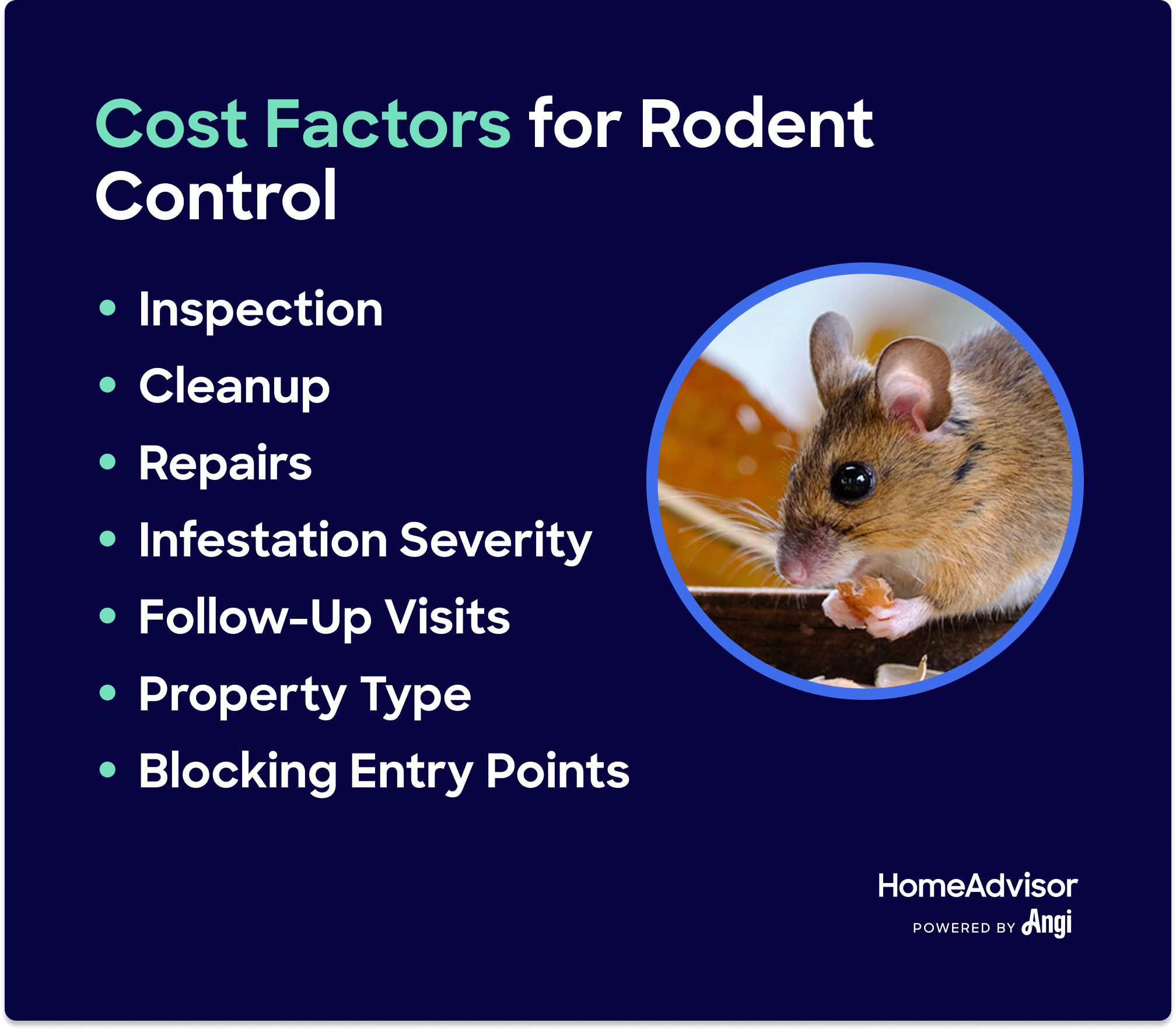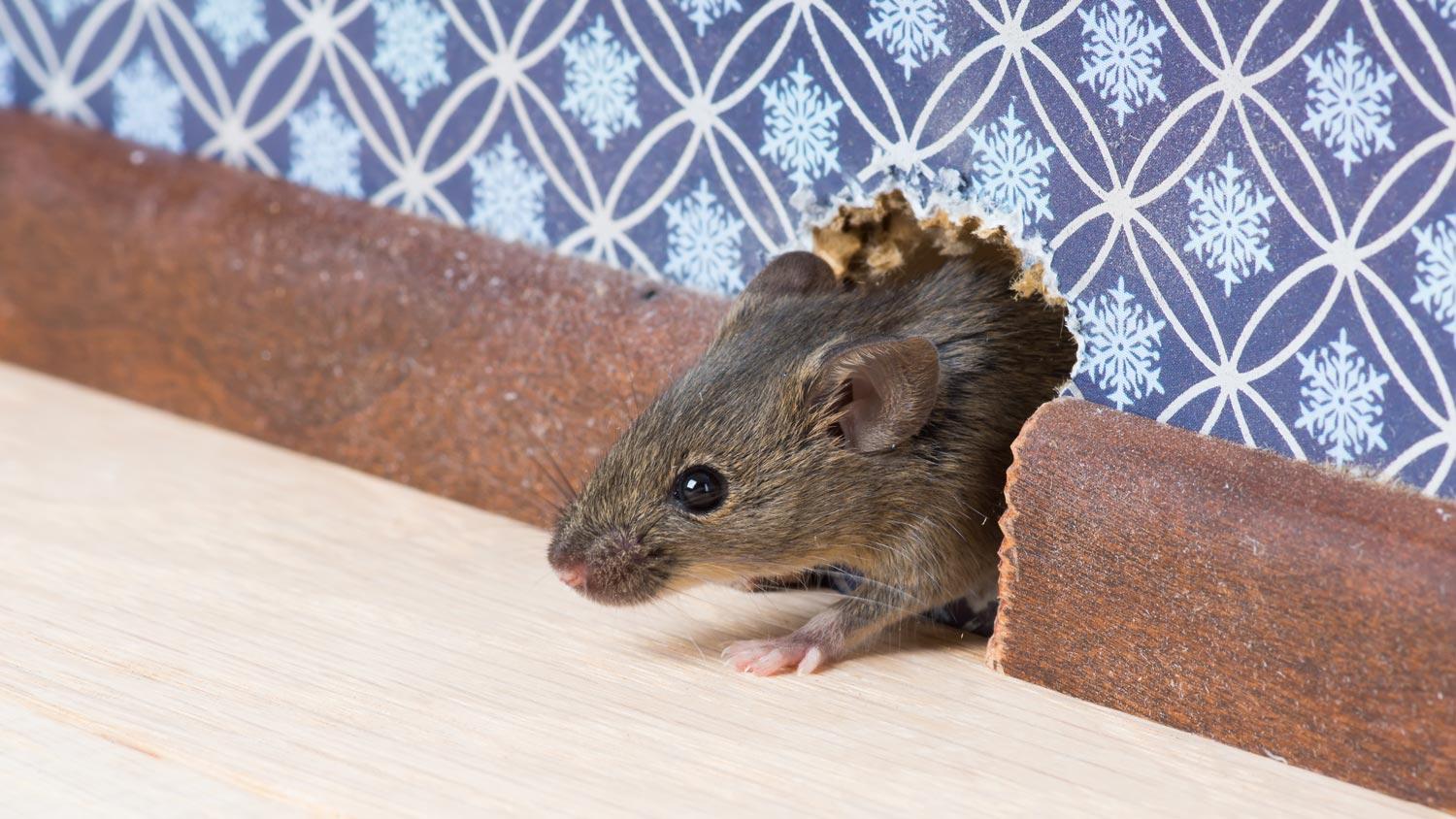How Much Does Rodent Removal Cost?
Typical Range:
$1,782 - $4,583
Typical Range:
$1,782 - $4,583
Cost data is based on actual project costs as reported by 34,000 HomeAdvisor members. Embed this data
.
.
.
.
.
.
.
.
.
.
.
.
.
.
.
.
.
.
.
.
.
.
.
.
.
.
.
.
.
.
•
•
•
•
Updated August 30, 2022
Written by HomeAdvisor.It’ll cost an average of $3,163 for professional rodent removal, with the typical range between $1,782 and $4,583. Depending on the size and infestation location, some mouse and rat removal can run up to $1,200.
Let's calculate cost data for you. Where are you located?
Where are you located?
| National Average | $3,163 |
| Typical Range | $1,782 - $4,583 |
| Low End - High End | $400 - $13,700 |
Cost data is based on actual project costs as reported by 34,000 HomeAdvisor members.
The most important factors for the cost of rodent removal are the size of your property and the extent of the infestation. Note the following:
The larger your property, the longer it’ll take to find and seal entry points. Larger properties are also prone to multiple points of entry to address, thus more pests to remove.
More pests mean higher costs. And the larger the infestation, the more traps, bait, and cleanup you’ll need.
The location and accessibility of the infestation will affect the cost. The harder it is to access the areas of infestation, the longer it’ll take to find and seal entry points, clean up feces, and repair damage.
Most companies offer a free inspection. If those in your area don’t, expect to pay about $100. For large properties or those with multiple buildings, you might pay as much as $250. The initial examination finds the type and extent of your infestation. After this, you should receive a written estimate for continued treatment.
Pros almost always include cleanup costs as part of the total project price, at around $200 to $600. However, large infestations requiring multiple visits with multiple cleanup sessions might increase the price. Keeping a clean home after removing the infestation is the best way to keep them from returning. Hiring a maid costs around $100 to $250 per cleaning.
The severity of the infestation determines the price because it impacts what treatment methods are necessary and how many follow-up visits the rodent exterminator needs to make. A small infestation costs between $200 and $400, while a moderate incursion costs around $250 to $500. A large infestation typically costs $330 to $600 to remove.
Most pros include the first follow-up in their first invoice. If you need more than one, it can add around $50 to $150 per visit or even double the price. Pest control companies sometimes offer monthly, bimonthly, or even quarterly follow-up plans.
The property type impacts the price you'll pay for rodent removal. If you have a large, sprawling property with a widespread infestation, expect to pay more than the average price. That's because a large property and widespread infestation require more labor to inspect the area, identify entry points, and lay traps. Additionally, the exclusion process will take longer because there are likely to be more entry points than the average, compact property.
If you've got a rodent problem confined to a small area, like a shed, you'll pay at the lower end of the price range. It's comparatively easier to remove rodents beneath a shed than from a whole house or an attic.
The cost of rodent exclusion, which is the process of eliminating rodent access to your home, is included in the extermination and removal fees of $200 to $600. The pro will seal all entry points against further incursions, but exclusion requires more than sealing holes. You'll also need to:
Prune trees: Rats and mice use these like stairs to gain access to your home.
Screen crawl spaces: Screens over air vents can prevent rodents from traveling through them.
Repair roofs: Keep your roof vents inaccessible with screens and repair any holes.
Besides the actual removal service, rats, mice, and raccoons often create expensive messes and damage. Here’s what might be in store after the removal:
Cleaning fees: $100–$200
Drywall repair costs: $350–$800
Electrical repair costs: $150–$500
HVAC repair fees: $75–$2,100
Plumbing repair prices: $180–$450
Roofing repair pricing: $350–$1,500
Water cleanup costs: $1,200–$5,000
Talk to your insurance company to see if they cover any of these repairs.
You can choose from various methods to catch or kill rodents. We discuss them in detail below.
Live removal costs are incredibly situational and regionally dependent, but you can expect to spend at least $50 or more. The added expense comes from relocating the pests at least 1 mile from any home, which takes time, adds mileage to vehicles, and uses extra fuel. Imagine the time, energy, and work it would take to remove rodents from a large city like Los Angeles to an unpopulated area versus the short drive to a field outside a rural town in Nebraska. However, some pros advise against this method for rodents since they’re likely to die outside in the winter.
Fumigation for any pest costs around $1 to $3 per square foot. So, for a 2,000-square-foot home, you'll pay anywhere from $2,000 to $6,000. However, qualified pros can easily control any rodent infestation with bait, traps, and exclusion; most don't even offer fumigation services. Only fumigate as a last resort. It's disruptive and harmful for several reasons, such as the following:
You’ll potentially expose yourself, your family, and your pets to chemicals.
You'll need to move out of your home for a few days.
It leaves dead rodents to decompose in the walls.
Chemicals escape into the environment, possibly causing harm.
Live traps are a humane method of pest removal that are kinder to the environment, with costs starting at $50 per visit. To use live traps, the pest control pro must take the rodents at least 1 mile (many recommend at least 3 miles) and release them in an unpopulated area.
Kill traps are less expensive, but they kill the rodents. The most humane kill traps, like electric ones, eliminate the animal quickly, without fear, stress, or excessive pain or trauma.
Auto-reset C02 traps are the most costly kill traps but are also the most effective, efficient, and humane option. And because the pro doesn't need to visit as often, the cost of the total extermination project is less overall. With auto-reset C02 traps, the animal sticks its head inside to check out the appealing scent and has its neck quickly broken when it activates the sensor. The trap then resets itself, waiting for the next rodent. Many also have a strike counter, so you know when the carbon dioxide is getting low and needs replacing. Some traps can dispatch 20 or more rodents before the canister needs replacing.
With the abundance of humane and effective line and kill traps available, we recommend against using inhumane options like glue traps, which cause needless pain and suffering.
Keeping mice and rats out of your home isn't tough to do yourself. Prevention is key, so keep a clean house with food stored in airtight containers and clean spills immediately after they happen. Many homeowners try a DIY approach to rats and mice with traps and poisons, with varying results.
To get rid of your pest problem without risking your or your family's health, contact a rodent control company near you. Remember: Poisons are inhumane, take time to work, and can put children, pets, and other wildlife at risk.
If you’re set on the DIY approach, understand the different methods available, and remember these points before starting:
Traps of all sorts are available, but not all traps are appropriate.
Don’t use poison if you have pets. If your pet eats a poisoned rat or mouse, they get poisoned too.
Avoid steel traps since they can injure your pets.
| Rodent Trap Type | Average Price Range | Description |
|---|---|---|
| Snap trap | $1 – $2 | Inexpensive and effective; not very humane |
| Live trap | $2 – $15 | Most humane; releases pests at least 1 mile from your home |
| Jaw traps | $3 – $5 | Very effective and kills quickly |
| Glue trap | $3 – $10 | Sticky pads that immobilize pests; inhumane; avoid these when possible |
| Bait station | $5 – $15 | Safer way to use poisons around pets and family |
Pest control is as much about your home as your health. Don't hesitate to call a pro when you have a pest problem. This will help keep your family, pets, and home safe and pest-free.
Rodent exclusion eliminates rodent access to your home and costs around $200 to $600.
Rodent exterminators use a combination of traps and bait stations to kill mice. They also seal up your home and clean up any droppings.
Depending on the infestation, it can take a few days to a few weeks.
The best way to identify rat entry points is with a local pest control pro trained and experienced in finding them. They’re not always obvious, and leaving even one open can lead to re-infestation.
The best way to keep rodents away from your home is to keep all food sources secure and block all entries. Keep a clean home and your food in secure, airtight containers.
A humane rodent trap is the best way to eliminate rats in your walls and attic. Poisons also work but present a health hazard for both your family and pets. For the most humane solution, either choose a live trap and release the animal at least a mile from any human dwelling, or use an electronic or auto-reset C02 trap that kills the animal quickly and painlessly.
There are plenty of conflicting reports on its effectiveness. However, most experts agree that peppermint oil won’t get rid of already nesting rodents, but it might help deter future infestations.

